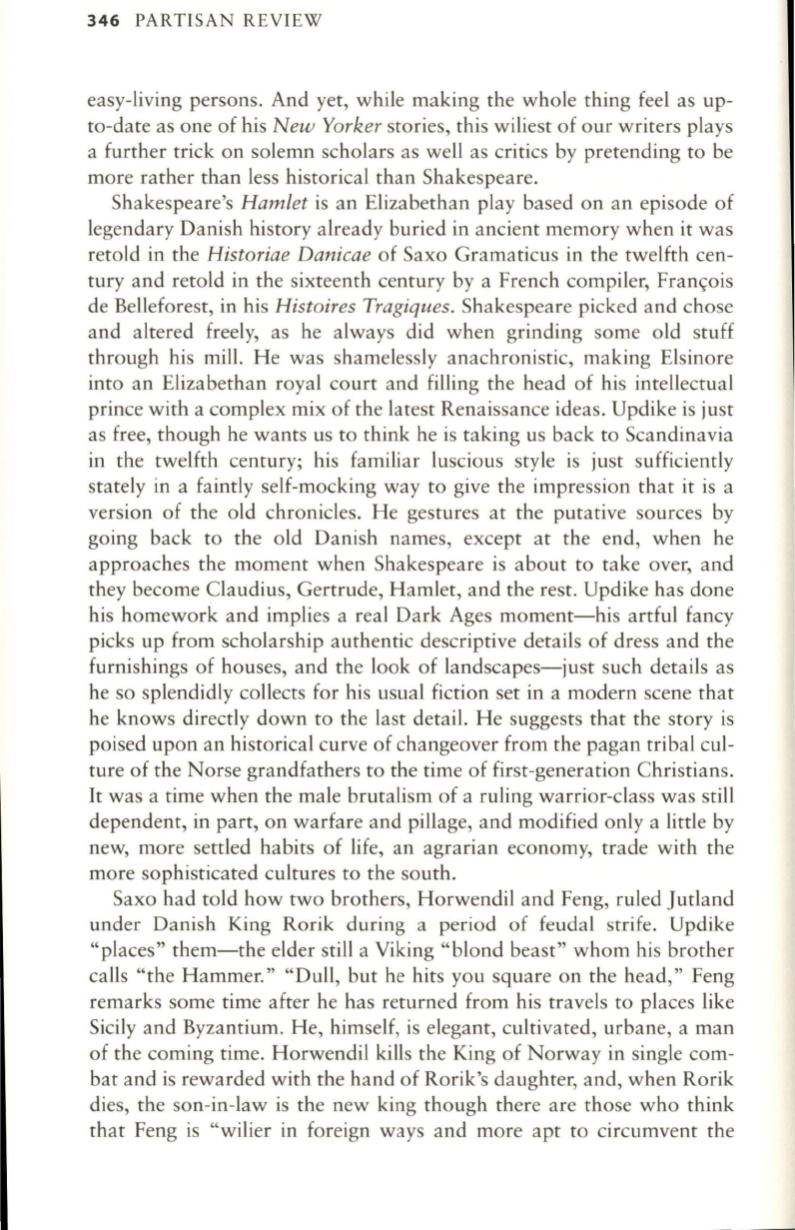
346
PARTISAN REVIEW
easy-living persons. And yet, while making the whole thing feel as up–
to-date as one of his
New Yorker
stories, this wiliest of our writers plays
a further trick on solemn scholars as well as critics by pretending to be
more rather than less historical than Shakespeare.
Shakespeare's
Hamlet
is an Elizabethan play based on an episode of
legendary Danish history already buried in ancient memory when it was
retold in the
Historiae Danicae
of Saxo Gramaticus in the twelfth cen–
tury and retold in the sixteenth century by a French compiler, Franc;ois
de Belleforest, in his
Histoires Tragiques.
Shakespeare picked and chose
and altered freely, as he always did when grinding some old stuff
through his mill. He was shamelessly anachronistic, making Elsinore
into an Elizabethan royal court and filling the head of his intellectual
prince with a complex mix of the latest Renaissance ideas. Updike is just
as free, though he wants us to think he is taking us back to Scandinavia
in the twelfth century; his familiar luscious style is just sufficiently
stately in a faintly self-mocking way to give the impression that it is a
version of the old chronicles. He gestures at the putative sources by
going back to the old Danish names, except at the end, when he
approaches the moment when Shakespeare is about to take over, and
they become Claudius, Gertrude, Hamlet, and the rest. Updike has done
his homework and implies a real Dark Ages moment-his artful fancy
picks up from scholarship authentic descriptive details of dress and the
furnishings of houses, and the look of landscapes-just such details as
he so splendidly collects for his usual fiction set in a modern scene that
he knows directly down to the last detail. He suggests that the story is
poised upon an historical curve of changeover from the pagan tribal cul–
ture of the Norse grandfathers to the time of first-generation Christians.
It
was a time when the male brutalism of a ruling warrior-class was still
dependent, in part, on warfare and pillage, and modified only a little by
new, more settled habits of life, an agrarian economy, trade with the
more sophisticated cultures to the south.
Saxo had told how two brothers, Horwendil and Feng, ruled Jutland
under Danish King Rorik during a period of feudal strife. Updike
"places" them-the elder still a Viking "blond beast" whom his brother
calls "the Hammer." "Dull, but he hits you square on the head," Feng
remarks some time after he has returned from his travels to places like
Sicily and Byzantium. He, himself, is elegant, cultivated, urbane, a man
of the coming time. Horwendil kills the King of Norway in single com–
bat and is rewarded with the hand of Rorik's daughter, and, when Rorik
dies, the son-in-law is the new king though there are those who think
that Feng is "wilier in foreign ways and more apt to circumvent the


